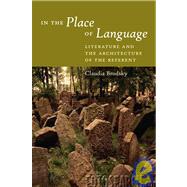In the Place of Language Literature and the Architecture of the Referent
, by Brodsky, Claudia- ISBN: 9780823230006 | 0823230007
- Cover: Hardcover
- Copyright: 9/1/2009
The "place" in the title of Claudia Brodsky's remarkable new book is the intersection of language with building, the marking, for future reference, of material constructions in the world. The "referent" Brodsky describes is not something first found in nature and then named but a thing whose own origin joins language with materiality, a thing marked as it is made to begin with. In the Place of Language: Literature and the Architecture of the Referent develops a theory of the "referent" that is thus also a theory of the possibility of historical knowledge, one that undermines the conventional opposition of language to the real by theories of nominalism and materialism alike, no less than it confronts the mystical conflation of language with matter, whether under the aegis of the infinite reproducibility of the image or the identification of language with "Being."Challenging these equally naive views of language - as essentially immaterial or the only essential matter - Brodsky investigates the interaction of language with the material that literature represents. For literature, Brodsky argues, seeks no refuge from its own inherently iterable, discursive medium in dreams of a technologically-induced freedom from history or an ontological history of language-being. Instead it tells the complex story of historical referents constructed and forgotten, things built into the earth upon which history "takes place" and of which, in the course of history, all visible trace is temporarily effaced. Literature represents the making of history, the building and burial of the referent, the present world of its oblivion and the future of its unearthing, and it can do this because, unlike the historical referent, it literally takes no place, is not tied to any building or performance in space. For the same reason literature can reveal the historical nature of the making of meaning, demonstrating that the shaping and experience of the real, the marking of matter that constitutes historical referents, also defers knowledge of the real to a later date. Through close readings of central texts by Goethe, Plato, Kant, Heidegger, and Benjamin, redefined by the interrelationship of building and language they represent, In the Place of Language analyzes what remains of actions that attempt to take the place of language: the enduring, if intermittently obscured bases, of theoretical reflection itself.







